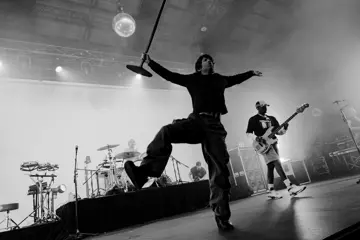It was some night mid-week in early September 2009 when I went for a pint at Leederville's JB O'Reilly's with a friend and saw two guys, hair everywhere, playing with reckless abandon. Later that week, at Mojo's with the same mate, there they were again. For a while, it seemed you couldn't go out on the weekend without catching at least one gig where The Joe Kings were playing. Those three-hour sets as a duo in JB O'Reilly's – and anywhere else that would put them on the bill – helped them cut their teeth. “Me and Phil [Leggett, Afro-haired guitarist] had a lot of catching up to do with each other's musical influences,” says frontman Jack Stirling. “It never got tiring. Easily for about a year or two years we played relentlessly as a duo and it was fun. Our writing style changed a lot. We had the kick drum and Phil would play electric and I'd play acoustic and that stayed the same, but the writing changed a lot which kept it exciting.”
It was as much about getting their name out there as it was about getting gig experience and learning to perform. They took any opportunity presented to them, and soon they were snapping up supports or playing down south. They lost jobs over playing gigs instead of working. A by-product of those long sets and discovering new influences was the education of learning those songs well enough to play week in, week out. In some ways it was an old approach – the folk, blues or jazz approach of learning other's songs and paying one's dues – the same way that bluesmen like Howlin' Wolf, Woody Guthrie and even The Rolling Stones did it. But we might be getting ahead of ourselves. “A lot of [it] was that Phil's influences were really interesting to me,” Stirling says. “He was playing me songs I'd never heard, or he'd say he always wanted to play a particular song and we had a chance to somehow try to pull them off live. We indulged so much then.”
It was after two years of playing the circuit as a duo that Stirling and Leggett added the rhythm section of Ryan Brewer and Riley Watson-Russell. They started headlining more gigs, playing fewer shows but to more people. The covers that they chose fitted in with the style they aspired to write themselves. Well, most of the time. “At that last Fly By Night show,” Leggett says, “we did that Beyoncé song, Crazy In Love. So that's different, but we did make it our own, I reckon.” And to bring it all up to date, they scored a Jeff Martin tour support, did a 36-date tour for their second EP and finalised the move to Melbourne in February. “We kind of did it backwards,” continues Leggett. “We moved, then we went on tour, then lost our houses and jobs and then moved and got them all again. Now we feel settled. We tried to get in as many shows [on the tour] as possible to say 'Hello, Australia!'”
At the end of the tour it was time to head into the studio and start work on their first full-length release. Steve Schram, known for his work with The Cat Empire and Little Birdy, sat at the production desk. But there had been a change for the band, some sort of realisation or moment of clarity, at the end of the tour. “We thought it would be nice to do short snappy songs and give it that punch,” Leggett says. “Like on that Yardbird's record, [Eric Clapton]sings 'Good morning little schoolgirl', and it just goes chorus-verse-chorus-outro or whatever, and it just hits you. It's a nice little punch.”
Don't miss a beat with our FREE daily newsletter
“We'd been moving towards that. Schram brought it out more,” Stirling says. “We'd been moving towards that and shortening songs that didn't necessarily need to be that long. There were parts of songs that didn't necessarily have to be part of that song or we could use for another song. In the past we'd try to cram everything in and we'd get so excited about a new song that we'd try to put in this section and that section and… cram as much in it.”
Schram's influence went beyond a basic producer's role. Leggett says they now gel better as a band and he attributes that to learning from Schram, and he's keen to see how that plays out in the next tour. There was also a wealth of experience that be brought to the table. “In the EP before this we hadn't been together as a band as long and we hadn't played a lot of shows and we were allowing ourselves to jam a lot more,” explains Stirling. “The songs were more bluesy and blues rock and were longer and had a lot of sections that weren't that necessary for a record. So we got these long epic sets together with all these intros and outros and we found it difficult on the last EP to refine them and to hone in on a song. The biggest change I noticed on this album was that by this stage we'd learnt as a band a lot more about the catchiness of songs and how they had to get to a point.”
Schram immediately saw through the long jams the band had worked out and helped refine the songs to the kernel at their heart. Though the band had that direction in mind, it was Schram that helped them navigate those seas and gales. “He knew our style and he knew what to do to get that,” says Stirling. “He knew how to get that part of the music out instead of being taken over by the epic dirty bluesy rock side. We've made a definite progression to upbeat and fun songs and [they're] a bit easier to listen to.”
They're quick to point out that it's not a huge departure from their sound – fear not, long term fans. Perhaps it's best described as less of a departure and more of an evolution, or a continued education in the craft of songwriting. Once in the studio, they found the producer made sure that the simplicity and directness of the songs was more of a conscious decision. At times it was necessary to throw away the embellishments to focus on the performance the song needed. “A lot of the songs on this record, even progression-wise, everyone had changed what they were listening to,” says Stirling. “I was listening to a lot of Paul Simon [songs]; they're major and not too complicated. A lot of things in the writing I was doing and in Phil's guitar playing, it all worked its own way into feeling like that.”
It makes for more than just a snappy record. “We're doing a number of warm-up gigs for the tour and we tried out a lot of the new songs,” says Stirling. “There was such a different feeling even in the live set. The song started, peaked and then ended instead of all these sections that aren't necessary every song. Of course, live you can indulge, but you can't milk it too much.”















